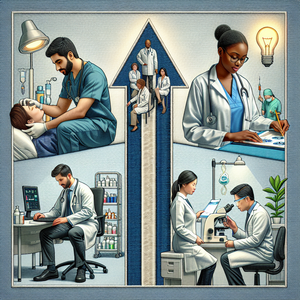
Exploring the Top 20 In-Demand Healthcare Careers: Descriptions, Requirements, and Future Prospects
The healthcare sector stands out as one of the most rapidly expanding fields worldwide, offering diverse career paths that align with various interests and expertise. As the need for healthcare services surges—prompted by an aging demographic and advancements in medical technology—the array of opportunities for aspiring professionals is vast. This guide delves into 20 in-demand healthcare roles, providing insights into their responsibilities, educational pathways, salary expectations, and growth potential.
Job Summaries:
Medical Assistant:
- Medical Assistants are pivotal in healthcare settings, handling both administrative and clinical duties.
- They schedule appointments, manage patient records, and assist healthcare providers.
- A high school diploma is essential, and pursuing certification can enhance job prospects.
- This role is anticipated to grow by 19% by 2030, making it an excellent entry point into the field.
Nurse Practitioner:
- Nurse Practitioners (NPs) are advanced practice registered nurses who offer comprehensive healthcare services, including diagnosis and treatment of illnesses.
- A master's degree in nursing and national certification are mandatory.
- The demand for NPs is expected to soar by 45% from 2020 to 2030, highlighting their vital role in patient care.
Pharmacy Technician:
- Pharmacy Technicians assist pharmacists by preparing medications and managing pharmacy operations.
- A high school diploma is required, along with certification from an accredited program.
- This role is projected to grow by 4% over the next decade.
Surgical Technologist:
- Surgical Technologists play a critical role in operating rooms.
- They prepare instruments and maintain sterile environments.
- Completion of an accredited surgical technology program is essential.
- The expected growth rate for this profession is 9%.
Medical and Health Services Manager:
- These managers oversee healthcare facilities or departments, ensuring efficient operations and compliance with regulations.
- A bachelor's degree in healthcare administration is typically required, with many roles preferring a master's degree.
- The field is projected to grow by 32% due to the increasing complexity of healthcare systems.
Occupational Therapist:
- Occupational Therapists assist patients in recovering and improving daily living skills.
- A master's degree in occupational therapy and state licensure are required.
- This role is essential for rehabilitation.
- Projected growth rate of 17%.
Speech-Language Pathologist:
- Speech-Language Pathologists (SLPs) diagnose and treat communication and swallowing disorders.
- A master's degree in speech-language pathology and state licensure are required.
- The demand for SLPs is forecasted to increase by 25%.
Health Information Technician:
- These technicians ensure the accuracy and security of health information data.
- A postsecondary certificate or an associate degree in health information technology is typically needed.
- This field is projected to grow by 9%, fueled by the rising use of electronic health records.
Radiologic Technologist:
- Radiologic Technologists conduct diagnostic imaging examinations, such as X-rays and MRIs.
- A degree in radiologic technology and state licensure are necessary.
- This profession is expected to grow by 9%.
Physician Assistant:
- Physician Assistants (PAs) practice medicine under physician supervision.
- PAs perform exams and develop treatment plans.
- A master's program and certification are required for PAs.
- The demand for PAs is anticipated to grow by 31%.
- This growth underscores the significance of PAs in healthcare teams.
Dental Hygienist:
- Dental Hygienists provide preventive care and educate patients on oral health.
- This role requires an associate degree in dental hygiene and state licensing.
- The projected growth rate for dental hygienists is 11%.
Medical Laboratory Technician:
- Medical Laboratory Technicians perform laboratory tests that aid in disease diagnosis.
- A degree in medical laboratory technology and certification are required.
- This field is expected to grow by 11%, reflecting the rising demand for diagnostic services.
Home Health Aide:
- Home Health Aides deliver personal care to patients in their homes.
- Typically requiring a high school diploma and on-the-job training.
- This role is forecasted to grow by 33%.
- Growth is driven by the aging population.
Health Educator:
- Health Educators design programs to promote wellness within communities.
- A bachelor's degree in health education is usually needed.
- The profession is expected to grow by 17%.
Physical Therapist:
- Physical Therapists help patients recover from injuries through personalized treatment plans.
- A doctorate in physical therapy and state licensure are required.
- This role's demand is projected to increase by 21%.
Medical Coding Specialist:
- Medical Coding Specialists convert healthcare services into standardized billing codes.
- A postsecondary certificate or an associate degree in medical coding is typically required.
- This position is expected to grow by 8%.
Certified Nursing Assistant (CNA):
- CNAs provide essential patient care under nursing supervision.
- A state-approved training program and certification are necessary.
- This entry-level role is crucial for patient support.
- Projected to grow by 8%.
Veterinary Technician:
- Veterinary Technicians aid in diagnosing and treating animal health issues.
- An associate degree in veterinary technology and state licensure are required.
- This field is expected to grow by 20%.
Genetic Counselor:
- Genetic Counselors evaluate risks for inherited conditions.
- A master's degree in genetic counseling and certification are necessary.
- The demand for genetic counselors is projected to rise by 26%.
Healthcare Administrator:
- Healthcare Administrators manage healthcare facilities.
- Overseeing operations and compliance.
- A degree in healthcare administration is generally required.
- Preference for a master's degree.
- The growth rate for this role is projected at 32%.
The healthcare industry not only offers a broad spectrum of rewarding career opportunities but also significantly contributes to community health and individual well-being. With competitive salaries and promising growth rates, those interested in pursuing a career in this field will find numerous avenues to explore. For additional details on job openings, salary expectations, and educational pathways, consider checking reputable job boards or educational institutions specializing in healthcare training. Whether you're a student exploring potential career paths or a professional contemplating a transition, this guide serves as a comprehensive resource for navigating your journey within the dynamic healthcare landscape.
Explore More Jobs

